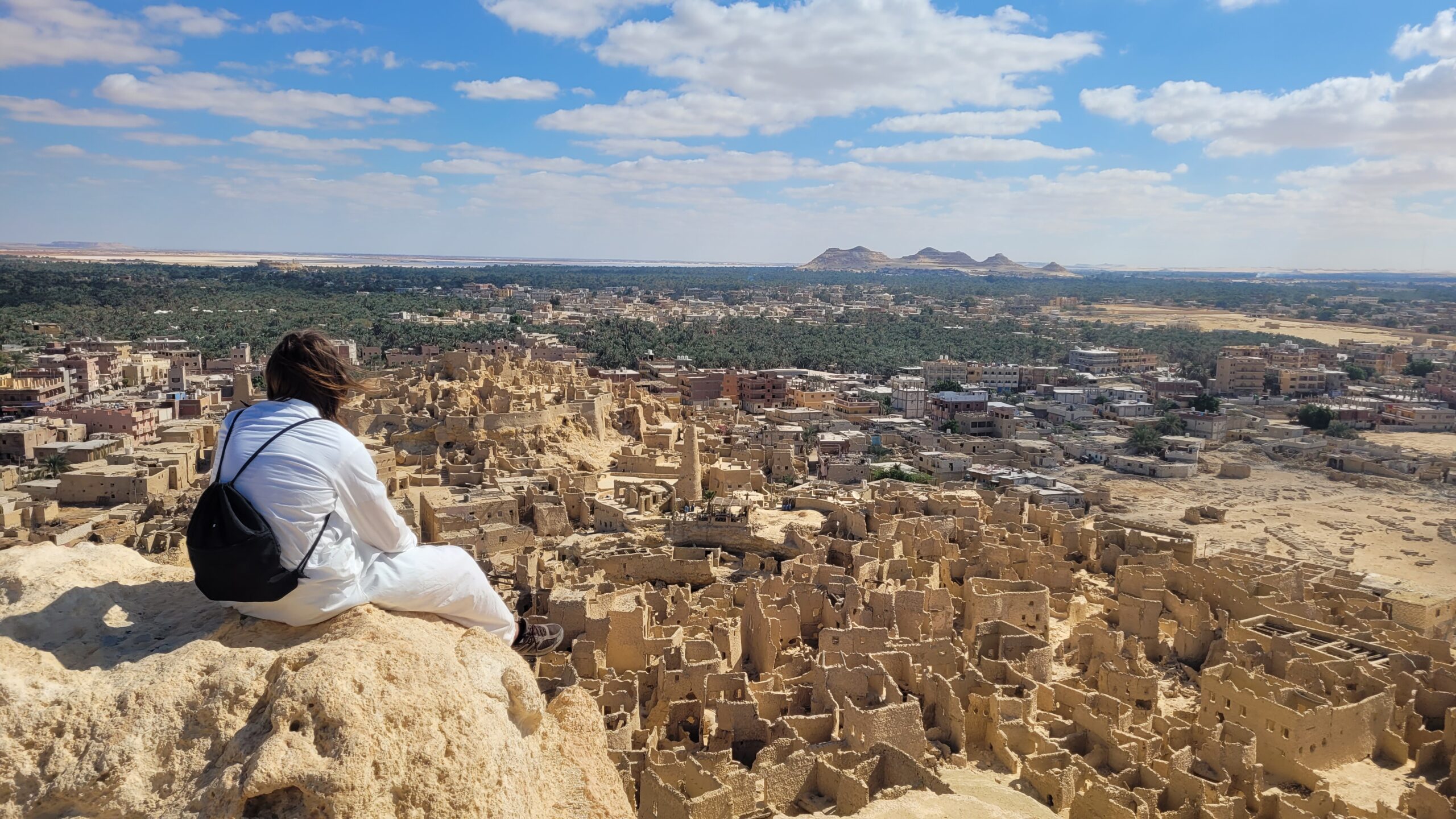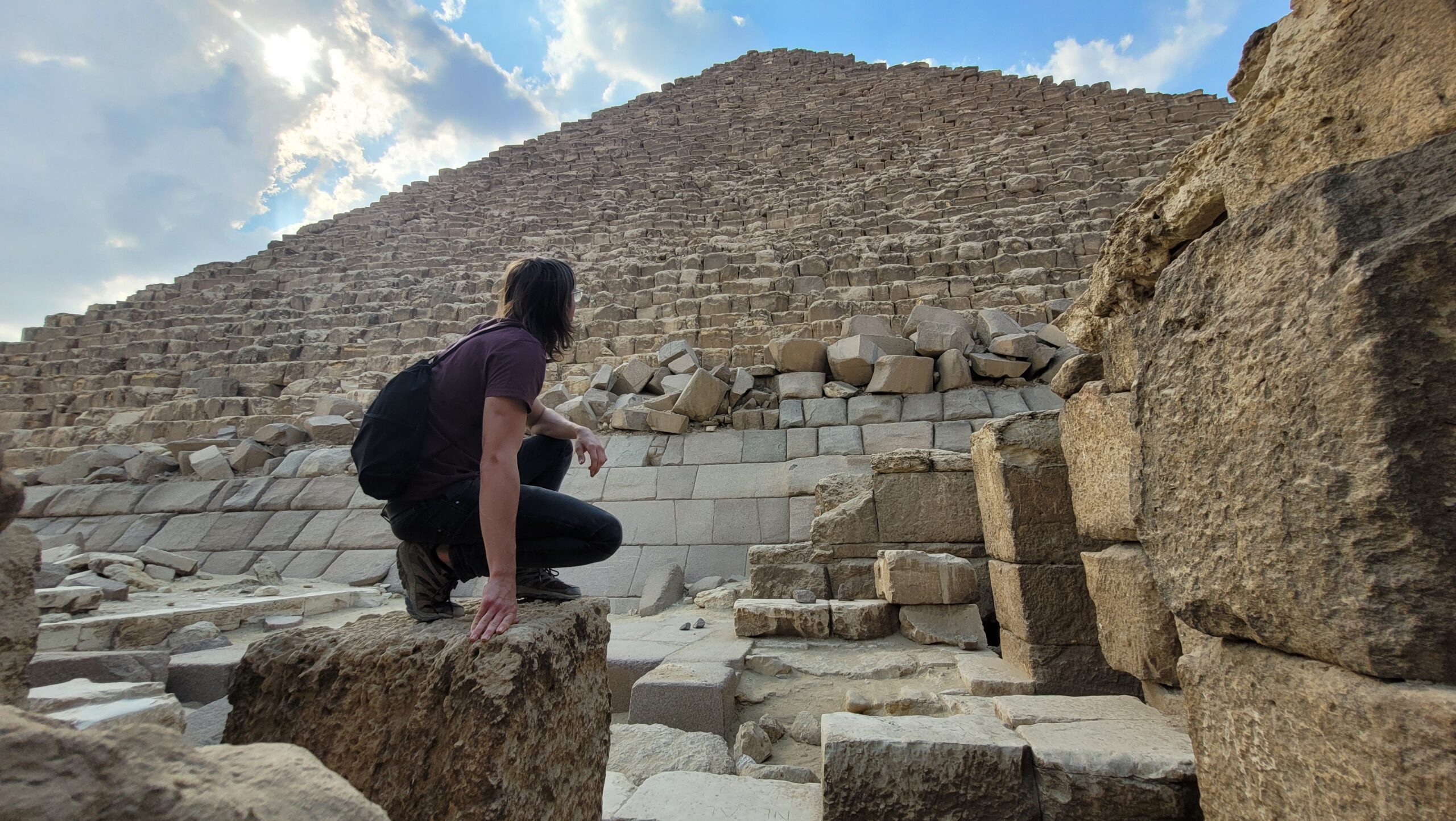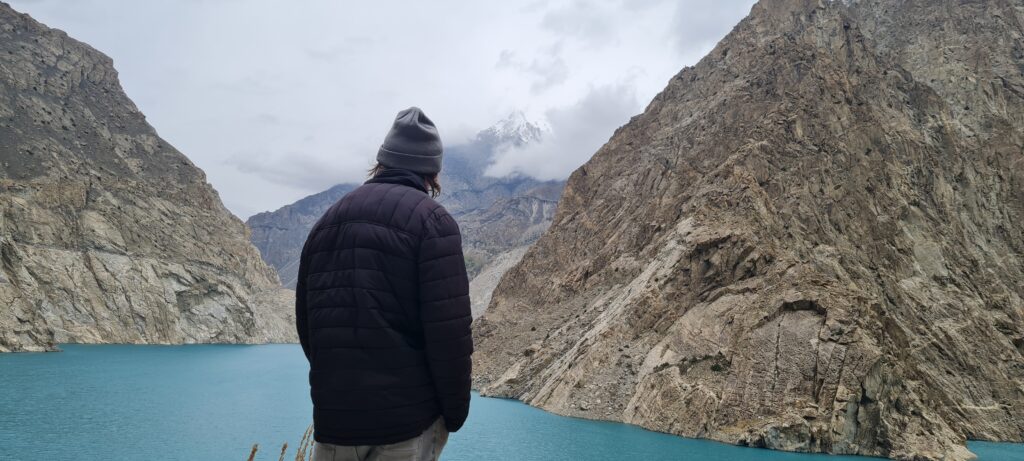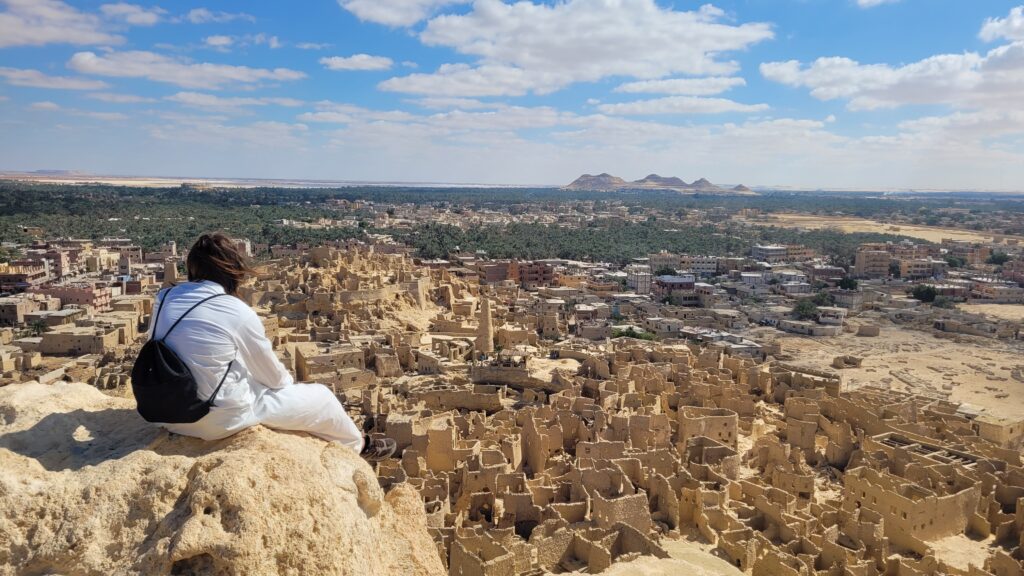How to visit Egypt in 2025
- Alexander
- No Comments
How to Visit Egypt in 2025 – A Complete Travel Guide
Egypt is one of those places you grow up hearing about. Who hasn’t heard about the Pharaos, Mummies and Pyramides as a child? But beyond the Instagram clichés and crowded group tours, there’s a version of Egypt that most travelers completely miss. One that’s raw, chaotic and fascinating.
That said, Egypt isn’t always an easy country to travel in. You’ll constantly run into scams, rip-offs, and aggressive haggling. If you want to avoid that and actually enjoy your trip, you’ll need to leave the tourist bubble behind and go a bit off the beaten path.
In this Ultimate Guide to Visiting Egypt, you’ll find everything I wish I knew before arriving: how to get around, what to see beyond the pyramids, how much money to bring, how to avoid scams, and most importantly how to experience the real Egypt, beyond the postcard version.
If you’ve been thinking about visiting Egypt but weren’t sure how to do without the overpriced tours, stress, or tourist filter, then this guide is for you.

Table of Contents
🪪 How to obtain a Visa for Egypt
Citizens from the EU, UK, US, and many Latin American countries can obtain either a Visa on Arrival or apply for an eVisa before entering Egypt.
✈️ Visa on Arrival
Cost: $25 USD (cash only) or equivalent in Euro
Available at: Major airports like Cairo, Hurghada, and Sharm El-Sheikh
When you land at Cairo Airport, you’ll likely see a long line of travelers queuing for their visas, usually with only one open counter. The Visa on Arrival process can take a while.
Already on the plane, I received an arrival card to fill out with passport info and return flight details.

💻 eVisa for Egypt
Cost: $25 USD for single entry, $60 USD for multiple entry
Validity: 30 days
Apply here: Egypt eVisa Portal
Processing time: Usually 2–5 business days
I personally used the eVisa to avoid the long wait at Cairo Airport.
🏝️ Sinai-Only Visa Stamp
Cost: Free
Where: Available at Taba Border Crossing
Validity: 14 days
Limitations: Only valid within parts of South Sinai — including Dahab, Sharm El-Sheikh, Nuweiba, and St. Catherine.
You cannot use this visa to visit Cairo, Luxor, or anywhere outside the Sinai Peninsula.
✈️ How to enter Egypt
✈️ By Air
Most travelers arrive in Egypt by air, and it’s well connected to Europe, the Middle East, and beyond. Major international airports include:
Cairo International Airport (CAI) – The main hub with the most connections
Hurghada (HRG) and Sharm El-Sheikh (SSH) – Ideal for beachgoers heading to the Red Sea
Luxor (LXR) and Aswan (ASW) – Surprisingly it’s cheaper to take a domnestic flight from Cairo to Aswan then taking the train. At least for tourists.
🛳️ By Sea
Ferries and cruise ships arrive from a few nearby countries, but sea entry is limited and less common. Some routes from Jordan (to Nuweiba) and Saudi Arabia operate, mostly used by regional travelers.
🚐 By Land
Egypt shares land borders with:
Palestine & Israel – Most commonly crossed at Taba Border Crossing, which gives you access to South Sinai. Here, you can get the Sinai-Only Visa Stamp (valid 14 days).
Sudan – The Qustul-Ashkeet border in the south is open. You’ll need a lot of time. Busses to Sudan go from Aswan.
Libya – Closed for Tourists.
🗺️ My favourite Spots in Egypt

🔗 Check out my full guide: How to visit Siwa
Siwa
Siwa is my most favourite place in all of Egypt, potentially all of North Africa. It’s an oasis close to the Libyan border, way out in the deep west of the country. Siwa has an insane amount of history, including Egyptian, Roman, Berber and even early Islamic influence all packed into this one tiny spot in the desert.
Palm Trees stretch over miles around the Oasis and natural Salt Lakes have you floating in the water’s surface.
As it’s part of rural Egypt it’s entirely different from Cairo, Luxor or Alexandria. The main thing that will remind you that you are still in Egypt is the constant honking in the main square. That’s everywhere in Egypt ;P
The local Amazigh (Berber) culture is still very much alive here. People speak Siwi, not Arabic, and the architecture has this earthy, sandcastle look that you probably won’t find anywhere outside Mali and Siwa.
Siwa isn’t easy to get to and that’s exactly why you should go. It was the most raw experience I got in Egypt.
Aswan
If Egypt ever felt too much for you, Aswan is the reset button.
For a city of its size Aswan is calm, warm and feels more human-sized after the chaos of Cairo and the tourist hustle of Luxor. I didn’t expect to like it as much as I did, but it ended up being one of the highlights of my trip.
The city sits along a really beautiful stretch of the Nile, honestly one of the nicest I saw in the whole country.
One of the best parts of Aswan is the strong Nubian culture. It’s still very present and proud here. The people I spoke to didn’t identify as Egyptian but Nubian. You’ll hear a different language being spoken, see colourful houses along the riverbanks, and feel that you’re somewhere with its own identity, not just another stop on a tourist trail.

🔗 Check out my full guide: How to visit Aswan
Cairo
Cairo is kind of a double-edged sword. On one hand, it’s touristic as fuck. Scammers hover around every major site, haggling is non-stop, and street vendors can get really aggressive. It can be exhausting, especially around places like the Pyramids or Khan el-Khalili (Cairo’s Souk).
Yet not too far away from those spots you can find the full opposite. Literally 15 minutes from the Pyramids, I found a small local restaurant where the owner refused to let me pay. He just wanted a picture of me because they never get foreign guests there. Let me say that again: 15 minutes away from one of the most visited tourist sites in the world, I was treated like a guest, not a walking wallet.
That gives you an impression of how factory like those tour companies work that the bus jsut lands at the pyramides, people take pictures and leave again. No one sticks around to actually see the city. It’s insanity to me how millions travel that way when it’s so easy to step off that conveyor belt and have a much deeper, more real experience and spend a fraction of the money doing so.
If you want to experience Cairo properly, I put together a full guide with my favourite local spots and how to escape the tourist trail.

🚌 How to get around in Egypt
Thanks to a pretty solid infrastructure, getting around Egypt is pretty easy, even though chaotic at the same time.
🚍 Buses in Egypt
For most routes, long-distance buses are the best option. They’re cheap, fairly comfortable, and way less of a hassle than dealing with trains. Companies like Go Bus and Blue Bus operate between all major cities, and you can book tickets online through the Bookaway app, which saves you from special tourist prices at ticket counters.
To give you an idea:
Cairo to Siwa: $19
Cairo to Luxor: $9
🛤️ Train in Egypt
There’s a train line that runs all the way from Alexandria to Aswan, passing through Cairo and Luxor and some other major towns like Daraw. While that sounds convinient on paper tourists are not allowed to ride in regular carriages. You’re put in special “foreigner cars,” which cost more than five times the local rate and come with an armed guard sitting somewhere in the train. It’s pointless, overpriced and honestly kind of ridiculous. If you’re on a budget skip the train entirely.
✈️ Domestic Flights in Egypt
Flights inside Egypt are cheaper than the train, which makes no sense, but here we are. If you’re short on time and want to get from Cairo to Aswan fast, check out EgyptAir or Air Cairo. Just remember delays are common. Cairo to Aswan or Luxor is normally less than 100€.
🚕 Taxis in Egypt
Taxis are everywhere, especially in Cairo, and you’ll need to haggle hard. Most drivers don’t use meters, and they will 100% try to overcharge you if you’re foreign. Apps like Uber and Careem work in Cairo and Alexandria. Unfortuantley a lot of times the driver will call you after accepting your trip to negotiate a higher price. If you don’t agree the ride gets canceled.

🛏️ Accommodation in Egypt
I used a mix of Booking and Airbnb during my trip, and never had an issue. In fact it’s easier to just book something online with a fixed price than asking around or getting scammed by a recption. You can find solid options for cheap, especially if you go outside the typical tourist zones. Unless it’s high season or you’re landing at 3am, you don’t need to book everything in advance. I usually booked accommodation same day.
👮 Safety in Egypt
Egypt is safe for travellers! I want to get this out of the way before writing endles paragraphs. Yet so many people, including government themselves are worried about safety in Egypt, especially after the Arab Spring.

This is what the current travel advice looks like by the british government. Besides that red area next to the Libyan border this map doesn’t make any sense. Siwa is probably one of the safest areas in the country, yet marked in deep “Advice against all but essential travel” color. There’s nothing out there but date palms and salt lakes. Yet it’s apparently “not safe unless essential.” Meanwhile, central London is totally fine, apparently. Even Sinia is safe besides the area close to Rafah.
Most of the warnings are written in case of extremely rare worst-case scenarios. The kind that could happen literally anywhere in the world. They sound dramatic on paper, but on the ground, you’ll feel way more relaxed than you expect.
For a full analysis of Safety in Egypt you can read Is Egypt Safe?
🛑 Scams in Egypt
Alright, let’s talk about the elephant in the bazaar: scams.
While Egypt is safe, the amount of hustling can get real annoying, real fast. I’ve never been anywhere else with so many people trying to scam me. You’ll need to negotiate everything, and people will try to rip you off for literally anything, starting with a bottle of water.
Let me list some basic stuff:
🐫 Camel Mafia
Camel rides around the Pyramids are legendary for scammy pricing. They’ll quote one price, then charge extra for “getting off the camel,” or “per photo.” Agree on everything before you get on. Or better yet, just skip it if you have any sympathy for the camels. I saw camels with actual flesh wounds from whipping. It’s not worth the Instagram pic.
🎟️ Fake Ticket Sellers / Guides & Only Credit Card
People outside official entrances sometimes try to sell you “tickets” or offer to guide you for a fee. At the Pyramids, they only accept credit cards, no cash. If you don’t have an Egyptian card, you’ll get hit with foreign transaction fees or your card might not work at all. Locals will offer to “help” by paying with their card if you give them the cash, but of course they’ll take a cut. It’s insane to think some people are earning a living just by tapping their card for tourists. Welcome to Egypt.
📸 Photo Traps
The most known one. Take a photo of someone and know you need to pay them 50€. Or someone aggressivley takes you to a perfect photo stop for an insane amount of money and starts screaming if you dont pay up. Let them yell. They won’t do anything, and the tourist police usually side with foreigners.
💰 Wrong Change
After paying something count it. There is a good chance you got wrong amount of money back on purpose.
Unfortunatley I could write a whole book on the different scams I personally experienced.
🌐 Sim Card and Internet in Egypt
Getting connected in Egypt is super easy and way cheaper than in most Western countries.
📱 SIM Cards
You can purchase a local SIM card either at the airport. I paid 8€ for 25GB. That’s a fourth of what I am paying in my home country. The main providers are Vodafone, Orange, and Etisalat. Coverage is decent across the country, and speeds are solid in the cities.
🛜 Wi-Fi
Most hotels and guesthouses offer free Wi-Fi. In Major Cities connection was smoothly. In Siwa the Wifi was quite weak, just like my sim card connection.

🏧Money Exchange, ATMs & Currency in Egypt
💰 Currency
The local currency is the Egyptian Pound (EGP).
1 Euro ≈ 58 EGP (rate may fluctuate. There currency keeps getting weaker since 2016)
ATMs work well in major cities like Cairo, Alexandria, Luxor, and Aswan. You can usually withdraw cash easily with international cards. That said, if you’re heading to rural spots like Siwa or smaller towns, bring cash with you.
Most hotels and guesthouses can be booked online with fixed prices, so you don’t need to carry cash just for accommodation.
When haggling or if you sense a scam, showing an almost empty wallet can save you some hassle. If the other person sees you don’t have much cash, they might just let you go. It’s good to only have little money in your wallet and some more somwhere hidden on your body.
🧭 Independent Travel in Egypt

Traveling independently in Egypt is definetly doable thanks to the strong infrastructure in the country. However I would not advice Egypt as your first solo travel destination, especially not as a woman.
You can easily plan your night stays with the help of Booking.com and Airbnb, travel around with Bookaway and Uber and if you do end up needing a guide simply use the GetYourGuideApp.
🔗 A deeper analysis of Independent Travelling you can find in
Is Egypt Safe

⛅ Best Time to Visit Egypt
You can visit Egypt all year round. But if you want the best mix of decent weather and fewer tourists aim for October to April.
🌞 Summer (May to September)
This is when most people from Europe show up because it’s holiday season. But unless you’re coming for a beach resort, it doesn’t really make sense. It’s hot as fuck, crowded, and not ideal for temple or city exploring.
🍃 Winter (December to February)
This is actually outside of the peak tourist season, which makes it pretty nice. Hotels are emptier, prices are better, and the weather is decent. Nights can get quite cold though.
🌸 Shoulder Seasons (October–November & March–April)
Weather is perfect and crowds are lower. Places like Siwa or Aswan might feel almost empty, in a good way.
Just keep in mind that Ramadan falls in spring and can change the vibe a bit. Some restaurants close during the day, and travel can be slower.
🥡 Food in Egypt
Egyptian food is cheap, filling and has a lot of flavour. Together with Lebanese, it might be my favourite in the middle east.
🍚 Koshari
If there’s one dish you absolutely have to try, it’s Koshari. It’s the national dish and is made of rice, pasta, lentils, chickpeas, fried onions, and spicy tomato sauce. It’s nothing I’d have expected as national dish but it’s insanely good. One Resteraunt in Cairo sells this and only this meal. You sit on a table and without ordering get the food and pay. One bowl is around 50ct. The place is called Koshary Abou Tarek and was my favourite in Cairo. It’s where the working class eats and you probably won’t see any tourists here. I ended up eating together with some Nigerian and Sudanese Immigrant workers.

🥙 Shawarma
Not originally Egyptian but it’s almost everywhere.
🥩 Hawawshi
Basically Egypt’s take on a meat pie. Spiced minced meat stuffed into crispy bread and baked.
🧅 Ful Medames
Mashed fava beans seasoned with lemon, garlic, oil, and cumin. It’s the Egyptian go-to breakfast.
Don’t Eat Western Food!
McDonald’s, KFC or Pizza Hut is where you are most likely to get food poisoning. Not the local street food.
👗 How to dress in Egypt
While in Cairo and Luxor you can dress like you would in Europe, you should be a bit more conservative in rural areas. People are used to tourism in the major cities, which doesn’t mean that you should show full skin though.
👕 How To Dress As A Man In Egypt
Shorts are fine in touristy areas like Cairo, Luxor, or on the Red Sea coast. But if you’re heading to places like Siwa, small villages, or hopping on public transport, wear long pants. No one will stop you for wearing shorts, but you’ll stick out even more than you already do.
👗 How To Dress As A Woman In Egypt
You don’t need to wear a hijab, but covering shoulders and knees is definitely a good idea. Loose-fitting clothes are your friend. In Cairo, you’ll see all kinds of styles, but in rural areas, dressing conservatively will make your life easier.

🤑 Budget Travel in Egypt
Egypt is one of the easiest countries to do on a tight budget. At least outside the tourist areas.
💸 Daily Budget
You can easily travel on 20€ a day if you stay in hostels or basic guesthouses, eat local food, and use buses or shared taxis.
🍛 Food
Street food is ridiculously cheap and most meals are under 1€.
🛏️ Accommodation
Hostels and guesthouses can be found for 5 to 10€ per night, especially outside of Cairo. Booking.com and Hostelworld work fine. If you’re traveling with someone, basic double rooms are often cheaper than two dorm beds.
🚍 Transport
Buses are the cheapest and most comfortable way to get around. Use Bookaway to find the best routes.
🎟️ Sightseeing
This is where your budget takes a hit. Tourist site entry fees are often way higher for foreigners than locals. Still, it’s Egypt and you’re here to see the Pyramids, temples, and tombs. Just be smart with what you pay for and avoid overpriced guides.
🧼 Extras
Laundry, SIM cards, snacks are all cheap. Just keep small bills handy and expect to negotiate prices for everything, from bottled water to tuk-tuks.
More on Egypt

How to visit Aswan in 2025

How To Visit Siwa in 2025 – An Ultimate Guide

Is Egypt Safe To Travel In 2025

How to visit Egypt in 2025

Alex
Welcome off the beaten path!
I’m Alex, a 23 year old traveler who loves to explore the corners of the world, that still seem to be untouched. In this Blog I want to share my experiences with you.


